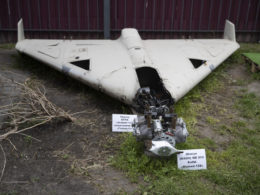Despite possessing no warships of its own, Ukraine has managed to gain advantage against the vastly more powerful Russian Navy in the Black Sea, reports the New York Times. According to Vice Admiral Oleksiy Neizhpapa, commander of the Ukrainian Navy, Ukraine has broken Russia's naval blockade of Odesa through innovative tactics and Western military aid.
Neizhpapa explained in an interview how Ukraine has negated some of Russia's naval superiority. Although Russia still dominates the skies and launches missile strikes from its ships, Ukraine's use of maritime drones, anti-ship missiles provided by allies, and targeted special operations have blunted Russia's edge.
Experts concur that Russia's Black Sea Fleet is now contained. "At this point, the Russian Black Sea Fleet is primarily what naval strategists term ‘a fleet in being’: It represents a potential threat that needs to be vigilantly guarded against, but one that remains in check for now... Ukraine has achieved this without a substantial fleet of its own," said Scott Savitz of the RAND Corporation. According to Britain's Defense Ministry, Ukraine has delivered a "functional defeat" to the fleet.
Ukraine's advances have relied on innovation and adaptability. For instance, stealth attacks by small teams on jet skis complement long-range missile strikes on Russian navy sites. Strikes have damaged Russia's Black Sea flagship Moskva, headquarters in Sevastopol, a submarine, and a shipyard.
“The classical approach that we studied at military maritime academies does not work now,” Admiral Neizhpapa said. “Therefore, we have to be as flexible as possible and change approaches to planning and implementing work as much as possible.”
Russia retains superiority in some domains, including dominating the Sea of Azov and using ships to launch missiles. However, Ukraine has negated enough advantages to gain the upper hand currently. Neizhpapa emphasized combined operations by Ukraine's armed forces, security services, and special operations troops.
The innovations allow Ukraine to strike back against Russia's naval advantages. Ukraine has embraced novel technologies like maritime drones and creative special operations tactics to gain a tactical edge.
The naval war demonstrates the power of new technologies like maritime drones to rapidly change tactics. “What we did a year ago is no longer working or is not working as effectively,” Admiral Neizhpapa said. “We have to be flexible and change our tactics.” Ukraine updates approaches frequently, while Russia requires years to modify ships. This flexibility has allowed Ukraine to turn 10,000 square miles off its coast into a 'grey zone' inaccessible to Russia without risk.
“The enemy also learns very quickly, and he also makes his own conclusions, counteracting our actions,” Admiral Neizhpapa said. “The war at sea can only be won with new solutions that must be implemented as quickly as possible.”
Both sides are locked in a cycle of innovation and adaptation. Ukraine must continue devising creative countermeasures even as Russia modifies its Black Sea Fleet strategy. Maintaining the initiative will depend on Ukraine's ability to rapidly deploy new capabilities before Russia can respond.
Nonetheless, Russia has damaged port infrastructure in retaliatory strikes. And its attacks, like the recent strike on a commercial ship in Odesa, seek to halt shipping. So far, over 100 cargo ships have exported Ukrainian goods since August. Ukraine remains committed to defending its coast and preparing new countermeasures as Russia adapts its Black Sea strategy as well.
Related:
- Ukraine hit two Russian small landing craft with naval drones
- Ukrainian Navy: 15 Russian warships destroyed, 12 damaged
- How Ukraine's scrappy marine drones are revolutionizing
- Russia to set up naval base in Georgia's Abkhazia as





